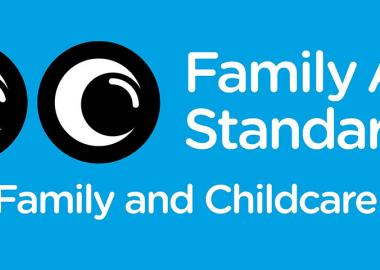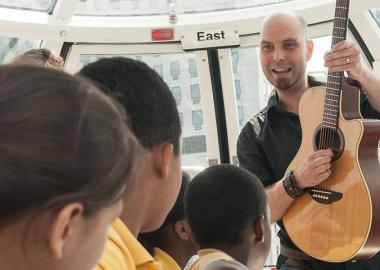This month I joined over 250 arts professionals at the bi-annual Family Arts Conference in Bristol to discuss and learn more about how we can make the arts accessible for families. Although the majority of people in the room represented professional arts organisations who often had their own venue, there were still many inspiring thoughts to take away from the day that could apply to Making Music members.
When we think of families, we automatically think of parents and children – but the theme of this year’s conference was that we need to change this thinking.
In an ageing society, families now commonly include grandparents and even great-grandparents. Older people may also come with carers, but then there are plenty of younger people who may also come with carers. The definition of family now needs to be expanded to include all of these people.
Kate Organ, a freelance consultant who was my highlight of the day, reflected on the fact that in the arts we are often seeking a younger audience. But, she stressed, an older audience is not a sign of failure. In fact, by actively seeking the younger audience, its's possible that we unconsciously create an apathy towards the older generation and cause them to feel side-lined. It’s important to remember that people of all ages can enjoy the arts, and to provide opportunities for all ages to do so, without excluding others.
Kate also spoke of research that has proved that there is a decline in people over a certain age going out in the evening – something which we at Making Music have already heard anecdotally through our members. But Kate highlighted the flourishing demand for matinee performances, which shows that there are plenty of other ways in which older people can engage with the arts if they are provided.
It was also highlighted that older people often come with other groups of people in tow – children and grand-children, but also parents (Kate gave an example of someone who had once answered a survey question with ‘our audience is mostly made up of older people and their parents!’) and carers. Sometimes the way into an arts event might be through the older generation, rather than the younger. What is important is that you allow people the opportunity to experience your art form together, as part of a group. As one speaker said ‘the audience told us that if we made it easier for them to attend as a group, they would come as a group’.
Several other speakers reflected on things they had tried in this vein – an accessible festival for families, relaxed performances, bring the grandchildren events – but all had the same message: that building an audience for these takes time, that the initial enthusiasm soon drops off and that interest builds slowly from there. Do try new things, but don’t be afraid to get it wrong and expect low numbers to start with. With confidence in your idea and a bit of determination, your family audience – young and old! - can grow.
Later in the day I attended the ‘Marketing to Families’ breakout session and was interested to learn about two useful platforms for communicating with younger people and families. Popjam is a creative social network for young people, with over 1M UK children using it. Although the content is mainly created by the users, they do want to have other content on there too – so you may be able to list your family event on there. We also learned about Hoop, a new app which helps kids and families to find activities suitable for 0-11 year olds in their local area. Currently available in 21 UK cities, they are hoping to be nationwide by the end of the year.
The day finished with some interesting statistics from Arts Council England and the Audience Agency. I learned that:
- Having a child aged 0-4 leads to a drop in arts engagement for adults, but a child aged 5-10 is a motivator for encouraging adults to engage in the arts.
- Parents with teenagers are less likely to engage with the arts.
- Teenagers who engage with the arts are healthier and happier than those who don’t.
- People who have recently moved house are more likely to engage in local cultural events.
- Events that are free, during the day time and are ‘drop in’ format appeal to cash-strapped families looking for ways to entertain their children.
- Children and family-branded events attract a greater cross-section of people.
These points were not particularly ground-breaking, but it was good to hear that research supports some of the things we have often suspected.
Further information
- Visit the Family Arts website to find out more about the Family Arts Standards, or to list your family-friendly event.
- You can read Kate Organ’s report on participatory arts for older people ‘After You Are Two’ on the Baring Foundation’s website.
- Arts Council England have a report on their recent research around older people and arts engagement, available on their website.










